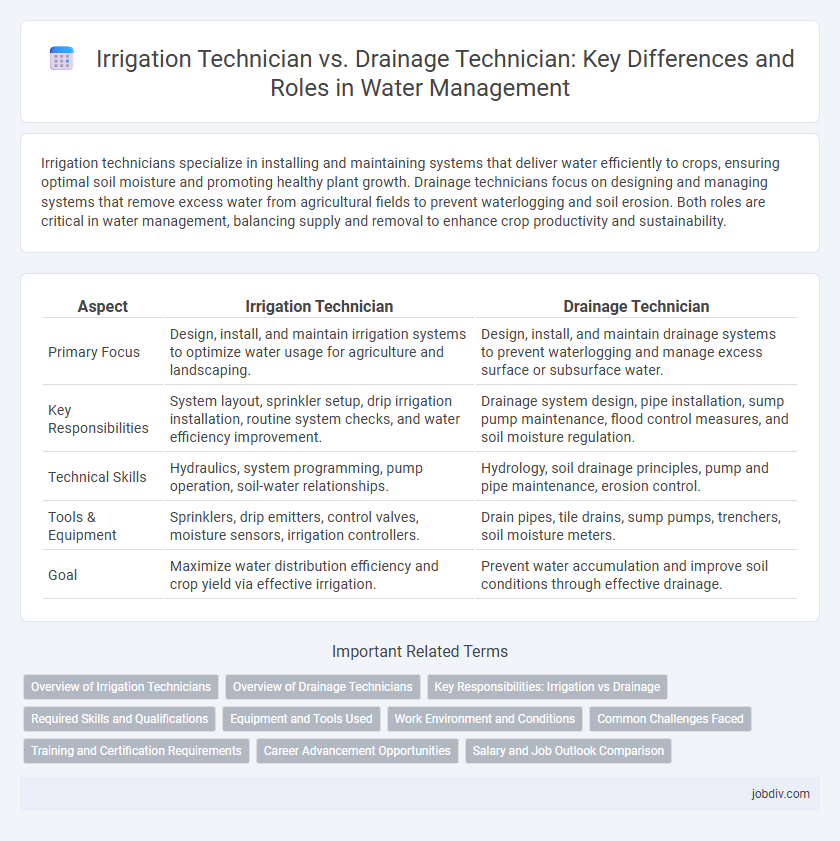Irrigation technicians specialize in installing and maintaining systems that deliver water efficiently to crops, ensuring optimal soil moisture and promoting healthy plant growth. Drainage technicians focus on designing and managing systems that remove excess water from agricultural fields to prevent waterlogging and soil erosion. Both roles are critical in water management, balancing supply and removal to enhance crop productivity and sustainability.
Table of Comparison
| Aspect | Irrigation Technician | Drainage Technician |
|---|---|---|
| Primary Focus | Design, install, and maintain irrigation systems to optimize water usage for agriculture and landscaping. | Design, install, and maintain drainage systems to prevent waterlogging and manage excess surface or subsurface water. |
| Key Responsibilities | System layout, sprinkler setup, drip irrigation installation, routine system checks, and water efficiency improvement. | Drainage system design, pipe installation, sump pump maintenance, flood control measures, and soil moisture regulation. |
| Technical Skills | Hydraulics, system programming, pump operation, soil-water relationships. | Hydrology, soil drainage principles, pump and pipe maintenance, erosion control. |
| Tools & Equipment | Sprinklers, drip emitters, control valves, moisture sensors, irrigation controllers. | Drain pipes, tile drains, sump pumps, trenchers, soil moisture meters. |
| Goal | Maximize water distribution efficiency and crop yield via effective irrigation. | Prevent water accumulation and improve soil conditions through effective drainage. |
Overview of Irrigation Technicians
Irrigation Technicians specialize in designing, installing, and maintaining efficient water delivery systems to optimize crop hydration and conserve resources. Their expertise includes monitoring soil moisture levels, calibrating irrigation equipment, and implementing technologies like drip and sprinkler systems to enhance agricultural productivity. Skilled in system troubleshooting and water management, they play a critical role in sustainable farming and landscape irrigation.
Overview of Drainage Technicians
Drainage technicians specialize in designing, installing, and maintaining systems that efficiently remove excess water from agricultural fields, preventing waterlogging and soil erosion. Their work ensures optimal soil moisture levels, improving crop health and yield by mitigating water-related stress. Compared to irrigation technicians who focus on delivering water, drainage technicians excel in managing water removal to sustain land productivity and environmental balance.
Key Responsibilities: Irrigation vs Drainage
Irrigation technicians specialize in designing, installing, and maintaining water distribution systems that optimize water usage for agricultural or landscaping purposes, ensuring efficient water delivery through pipes, valves, and sprinklers. Drainage technicians focus on developing and managing systems that prevent waterlogging and soil erosion by installing and maintaining pumps, drains, and channels to redirect excess water away from fields or structures. Both roles require expertise in hydraulic principles but target different aspects of water management to enhance crop health and land stability.
Required Skills and Qualifications
Irrigation technicians require expertise in hydraulic systems, soil science, and irrigation equipment installation, often holding certifications in irrigation technology or agricultural engineering. Drainage technicians must possess skills in drainage system design, water flow analysis, and soil permeability assessment, commonly requiring qualifications in civil engineering or environmental science. Both roles demand proficiency in surveying tools, problem-solving, and knowledge of local water regulations to ensure efficient water management.
Equipment and Tools Used
Irrigation Technicians primarily use tools like pipe cutters, trenchers, sprinklers, controllers, and drip irrigation components to design and maintain efficient water distribution systems. Drainage Technicians rely on equipment such as pumps, soil testers, drainage pipes, excavators, and GPS mapping tools to manage water runoff and prevent soil erosion. Both roles require expertise in specialized machinery, but Irrigation Technicians focus on water delivery technology while Drainage Technicians emphasize water removal infrastructure.
Work Environment and Conditions
Irrigation technicians primarily work outdoors in agricultural fields, installing and maintaining water systems under varying weather conditions, which requires physical stamina and adaptability to changing environments. Drainage technicians often operate in a mix of outdoor and indoor settings, managing water flow systems in urban and agricultural areas, sometimes working in confined or wet conditions that demand safety precautions. Both roles involve hands-on technical tasks, but drainage technicians may encounter more challenges related to water contamination and system blockages.
Common Challenges Faced
Irrigation technicians and drainage technicians frequently encounter challenges such as system clogging, equipment malfunction, and unpredictable weather conditions impacting water flow efficiency. Both roles demand precise maintenance skills to prevent leaks, soil erosion, and waterlogging, which can compromise crop health and yield. Effective troubleshooting and adaptation to site-specific hydrological conditions are critical to overcoming these operational obstacles.
Training and Certification Requirements
Irrigation technicians typically require training in water management, soil science, and system installation, often obtaining certifications such as the Certified Irrigation Designer (CID) or Certified Irrigation Contractor (CIC) to demonstrate expertise. Drainage technicians focus on hydrology, soil erosion control, and system maintenance, with certifications like the Certified Drainage Technician (CDT) enhancing their qualifications. Both roles benefit from hands-on experience and certifications from recognized organizations such as the Irrigation Association or the American Society of Drainage Professionals to ensure proficiency and compliance with industry standards.
Career Advancement Opportunities
Irrigation Technicians often have career advancement opportunities in agricultural management, water resource planning, and sustainable irrigation system design, with potential growth into supervisory roles or consultancy. Drainage Technicians may progress toward careers in environmental engineering, water management, and infrastructure maintenance, gaining expertise in flood control and soil erosion prevention. Both career paths offer specialization options, but irrigation roles generally provide a broader scope in smart technology integration and precision agriculture.
Salary and Job Outlook Comparison
Irrigation technicians earn an average annual salary of $42,000, driven by increasing demand in agricultural and landscaping sectors to optimize water usage. Drainage technicians typically make around $45,000 per year, reflecting their specialized role in managing water runoff and flood prevention in urban and rural areas. Job outlook for irrigation technicians is projected to grow 8% over the next decade, while drainage technician roles are expected to increase by 10%, fueled by climate change adaptation and infrastructure development.
Irrigation Technician vs Drainage Technician Infographic

 jobdiv.com
jobdiv.com